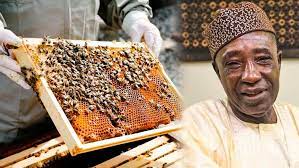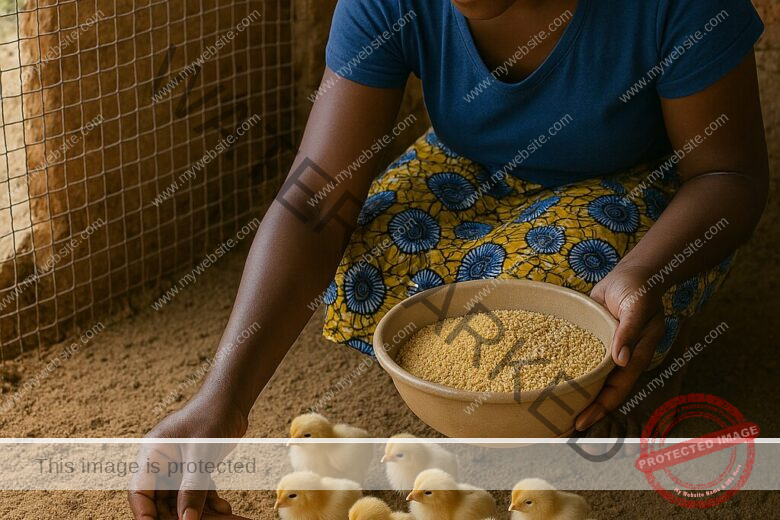Bee Farming in Nigeria today has grown into a major industry, with many bee farmers making large profits and taking their business globally. There are many reasons why you might want to consider starting your own bee-farming business. Bee farming is both a fascinating and lucrative industry.
The steps involved in bee farming start with training, Source for funding, selecting and preparing an area of land, constructing or purchasing, getting necessary equipment, installing your bee hive, getting your bees, stocking your bees, bee care, and wellbeing, and harvest.
If you are looking to start bee farming in Nigeria and produce high-quality honey, then look no further than this place to read this highly informative and educative content.
How To Start Bee Farming In Nigeria
You can become a bee farmer today without any hesitation. However, we advise that you carefully read this content compiled on how to start bee farming in Nigeria to learn all the tips.
Step 1: Get Training
You don’t just venture into beekeeping because it is not just all about keeping bees, there are tips, steps, and other important skills that you need to learn.
That is why it’s crucial to educate yourself and get training if you want to get into bee farming. After gaining knowledge, you must decide what kind of business to start because the information you have learned will help you decide how to proceed.
Step 2: Source for Funding
If you don’t have the capital to start a bee farm, you have to find a means of securing the fund. Because you need money to buy almost all the equipment needed in a beekeeping venture.
You can write a business plan containing all the information structure, feasibility, and finance to seek funding. You can source funding by getting a bank loan (not advisable but should be a last resort), from friends and family. You can apply for business grants as well.
Step 3: Select an Area of Land for Bee Farming
You must get land away from the population. This reduces the likelihood of stinging incidence. Even though bees can be dangerous, your farm needs to be surrounded by a fence or wall to deter daring thieves. The land should have good aeration with no air and waste pollution.
It’s not necessary to purchase land for your farming; you can rent land or work with a farmer in partnership.
Step 4: Construct or Purchase Bee Hive
You must have your bee hive boxes prepared. It must be fabricated in a way that makes honey collection easy. You should hire a qualified carpenter to make one for you. If you can, then you build your boxes. Better still, you can purchase already-made bee hives.
Step 5: Get the Necessary Equipment
Purchase the required equipment, such as your hives, frames, net, etc. To maintain your honey bee hive and protect yourself, you must also purchase protective clothing. Included in the bee protective attire are gloves, a cap, a base cover, and a thin coat.
Step 6: Install your Bee Hive
Your bee farm needs a healthy environment, so you should install your bee hive by adhering to the following:
- Avoid placing your hives in an area where insecticide is frequently used,
- Too close to a road, or in a crowded area due to noise.
- The swampy ground is also bad for your hives, so try to find some dry land.
- Avoid placing the hive facing direct wind because it is harmful to the bees.
Give yourself enough room between colonies so that you can walk through it without bumping into anything. Choosing a location where your bees can access food and water is crucial because it affects your success.
Step 7: Get Your Bees
Choosing the type of bees you want to farm is crucial. There are various species of bees. They include honey bees, mason bees, bumble bees, solitary bees, leaf-cutter bees, etc. Choose the best bee for you and begin keeping bees.
Step 8: Stock Your Bees
To avoid receiving the wrong product from your farm, it’s important to know when to start a colony of bees. If you start your colony too early, your bees might go without food, and if you start it too late, your bees won’t be able to produce much honey because they will have missed the main nectar flow.
A bee farm must have enough space for feeders, a reliable water source, and sugar.
Step 9: Bee care and Wellbeing
You must conduct inspection visits. This shouldn’t happen too frequently because it could stop the production of honey. Look for signs of disease, or parasite infestation, or see if any other animals are attempting to enter the hive.
Some fundamental signs that something is wrong with your colony include the absence of hatchlings, deformed wings, weakened province, lost bars, noticeable hive creepy crawlies or wax moths on the brush, and so forth.
Step 10: Harvest
The average period to harvest is 6 weeks, depending on how many there are.
Nectar can be collected in the autumn if you so choose. Remove the long, level hive outlines during this time.
Using a hot blade, scoop the wax and honeycomb into a can or container.
Remove the remaining wax cappings once the nectar has gradually sunk to the bottom of the container.
How Much Does It Cost To Start A Bee Farm In Nigeria?
The cost of starting a bee farm in Nigeria ranges from 50,000 Naira to 5,000,000 Naira or can be as high as 10,000,000 Naira depending on the scale you intend to start. Local production of beekeeping tools like hives helps to keep costs down.
Is Beekeeping Profitable In Nigeria?
Bee farming is a lucrative business that can be started for less than 150,000 Naira without incurring further expenses. There is no daily maintenance required for the bees, and you won’t need labor until harvest and processing season.
What Do I Need To Start A Bee Farm?
To start a bee farm, you need land (rented or bought), a hive, smokers, protective clothing, and feed.
How Profitable Is Bee Farming?
Bee farming is highly profitable. However, the amount you make depends on the quantity of honey you can harvest. Also, it is not a get-rich scheme but requires patience and time.
Which State In Nigeria Produces The Best Honey?
Kaduna state in the northern part of Nigeria produces the best honey.
How Much Does It Cost To Build A Bee Hive?
Building a bee hive will cost you between 5000 Naira to 10,000 Naira. However, the price is affected by the quality and size.
How Profitable Is Honey Business In Nigeria?
Honey business in Nigeria is a profitable business that guarantees high profit over time. You don’t need special skills to sell honey in Nigeria other than marketing skills. The product is in high demand so, ensure you meet the demand of customers by selling pure undiluted honey.
Does Nigeria Export Honey?
Nigeria is on the verge of exporting honey. However, there is still a clamor that the nation is not producing enough honey to meet local needs.
What is the Turnover Of Beekeeping To Nigeria?
The beekeeping global industry is worth $10 billion. However, the turnover of beekeeping in Nigeria is very low because the nation imports bee product to complement local production to meet up with local demand.
How many lands Do You Need To Keep Bees?
You don’t need large land to start a bee farm. A plot of land will do but you can go for a bigger land size depending on the scale of the bee farm you intend to establish.
How Do I Start A Bee Business?
Step 1: Choose suitable land
Step 2: Create or purchase hives
Step 3: Purchase the necessary equipment
Step 4: Install the hive
Step 5: Stock your bees into the hive
Step 6: Bee wellbeing
Step 7: Harvest honey
How Much Space Do You Need To Keep Bees?
A typical beehive measures approximately 22 inches by 16 inches. Around the hive, you need at least five feet of space in all directions.
Does Nigeria Import Honey?
Nigeria imports tonnes of honey annually to meet up with rising demand.
How Do I Test For Original Honey?
Try adding a few drops of honey to a vinegar-water solution. If the mixture begins to foam, this could indicate that the honey’s quality has been tainted.
Is Producing Honey Profitable?
If your bee farm is in an area with plenty of nectar sources, your bees can produce honey that will earn $300-$500 per hive per year. However, this assumes that you are selling your honey in a market willing to pay the premium for premium raw honey.
Is It Difficult To Keep Bees?
Beekeeping can be tasking because you have a lot of background work to do. You have to care for them, watch out for predators and pests that may attack your bees, and do several more tasking activities.
How Much Time Does Beekeeping Take?
Beekeeping will take between 5 to 10 hours per day. However, the more hives you have the more time you will spend caring for and maintaining your bee farm.
How Much Does A Queen Bee Cost?
The cost of a queen bee depends on the degree of bees you are buying. For a smaller colony of bees, the prices range from $15 to $25. The larger the colony, the cheaper the queen bee.
However, it is critical not to choose queens solely based on price, and do not expect every queen bee to make you a fortune.
How To Do Bee Farming In Nigeria
To start a bee farming business in Nigeria, you have to get training, a business plan, get funding, secure a good location, and purchase farm equipment. Also, you need to get the bees and stock them in the hive.
Bee Farming Training In Nigeria
To be a successful beekeeper, you need to enroll in training. That is why attending bee farming training in Nigeria is important because there are a couple of things you will learn such as:
- Site Selection
- Hive Installation
- Baiting
- Apiary Management
- Honey Harvesting
- Honey Processing
How Much Is Bee Hive In Nigeria
Beehive in Nigeria will cost you around ₦29,999 to ₦39,500
How Lucrative Is Bee Farming
Bee farming is an untapped gold mine because a barrel of honey costs more than a barrel of crude oil. The industry is expected to generate more than ten billion dollars per year.
Bee Farms In Nigeria
Bee farms in Nigeria are on the rise due to an increase in the number of bee farmers in the country. You can locate bee farms in Nigeria by looking up the internet or asking honey sellers to locate a be farm.
Where To Buy Bee Hive In Nigeria
There are numerous bee hive makers in Nigeria. You make your findings using the internet to locate the one nearest you.
Bee Keeping In Nigeria PDF
Beekeeping in Nigeria PDF is a comprehensive manual that contains all you need to know about beekeeping in Nigeria. You will learn all that you would have in on-site training.
You can download comprehensive beekeeping in Nigeria PDF from different sources. Make sure you make out time to read and study them.
Honey-Producing States in Nigeria
Kogi, Kaduna, Abuja, and Nasarawa state are the major honey-producing states in Nigeria.
Conclusion
Bee farming is a great and profitable business that can be started from anywhere and at any stage. Bee farming can create jobs and improve the economy. All you need do is adhere to the guidelines outlined and discussed here to start raising bees and producing quality pure honey.




